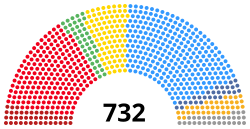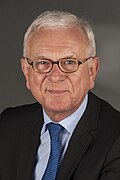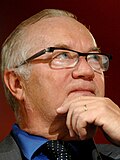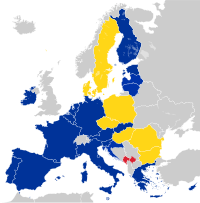2004 European Parliament election
| |||||||||||||||||||||||||||||||||||||||||||||||||||||||||||||||||||||||||
All 732 seats to the European Parliament 367 seats needed for a majority | |||||||||||||||||||||||||||||||||||||||||||||||||||||||||||||||||||||||||
|---|---|---|---|---|---|---|---|---|---|---|---|---|---|---|---|---|---|---|---|---|---|---|---|---|---|---|---|---|---|---|---|---|---|---|---|---|---|---|---|---|---|---|---|---|---|---|---|---|---|---|---|---|---|---|---|---|---|---|---|---|---|---|---|---|---|---|---|---|---|---|---|---|---|
| Turnout | 45.47%[1] | ||||||||||||||||||||||||||||||||||||||||||||||||||||||||||||||||||||||||
| |||||||||||||||||||||||||||||||||||||||||||||||||||||||||||||||||||||||||
 Post-election composition of each member state's delegation | |||||||||||||||||||||||||||||||||||||||||||||||||||||||||||||||||||||||||
| |||||||||||||||||||||||||||||||||||||||||||||||||||||||||||||||||||||||||
| This article is part of a series on |
 |
|---|
|
|
The 2004 European Parliament election was held between 10 and 13 June 2004 in the 25 member states of the European Union, using varying election days according to local custom. The European Parliamental parties could not be voted for, but elected national parties aggregated in European Parliamental parties after the elections.
Votes were counted as the polls closed, but results were not announced until 13 and 14 June so results from one country would not influence voters in another where polls were still open; however, the Netherlands, voting on Thursday 10, announced nearly complete provisional results as soon as they were counted, on the evening of its election day, a move heavily criticized by the European Commission.
342 million people were eligible to vote, the second-largest democratic electorate in the world after India. It was the biggest transnational direct election in history, and the 10 new member states elected MEPs for the first time. The new (6th) Parliament consisted of 732 Members of the European Parliament (MEPs).
Results showed a general defeat of governing parties and an increase in representatives from eurosceptic parties. No majority was achieved. The balance of power in the Parliament remained the same (largest party EPP-ED, second largest PES) despite the 10 new member states.
Results
[edit]| European Parliament election, 2004 - Final results on 20 July 2004 | ||||||
|---|---|---|---|---|---|---|
| Group | Description | Chaired by | MEPs | |||
| EPP-ED | Conservatives and Christian democrats | Hans-Gert Pöttering | 268 | 
| ||
| PES | Social democrats | Martin Schulz | 200 | |||
| ALDE | Liberals and liberal democrats | Graham Watson | 88 | |||
| G–EFA | Greens and regionalists | Daniel Cohn-Bendit Monica Frassoni |
42 | |||
| EUL–NGL | Democratic socialists and communists | Francis Wurtz | 41 | |||
| ID | Eurosceptics | Jens-Peter Bonde Nigel Farage |
37 | |||
| UEN | National conservatives | Brian Crowley Cristiana Muscardini |
27 | |||
| NI | Independents and far right | none | 29 | Total: 732 | Sources: [1][2][3] Archived 27 March 2009 at the Wayback Machine | |
Statistics
[edit]| European Parliament election, 2004 - Statistics | ||
|---|---|---|
| Area | European Union (EU-25) | Sources |
| Dates |
|
[4] |
| Seats | 732 | [5][6] |
| Candidates | over 14,600 | [7] |
| Electorate | 342 million | [8] Archived 12 December 2007 at archive.today[9][10] |
| Turnout | 45.6% | [11] |
| Previous | 1999 European Parliament election | n/a |
| Next | 2009 European Parliament election | n/a |
| Election methods | All proportional representation. | [12] |
| Preference voting allowed? | [13][14][15] | |
| Cutoff? |
|
[16][17][18] |
| Seat allocation |
|
[19][20][21][22][23] |
| Constituency boundaries |
|
[24][25][26] |
| Minimum voting age | 18 | [27] |
| Presidential election |
|
[28] |
| European Parliament election, 2004 - Timeline | ||||||||||
|---|---|---|---|---|---|---|---|---|---|---|
| Fifth Parliament | 2004 Election | Regrouping | Sixth Parliament | |||||||
| Groups | Pre-enlargement April 30 |
Pre-elections May 5 |
Change | Results June 30 |
Change | Results July 20 |
New Groups |
First session July 20 | ||
| EPP-ED | 232 | 295 | -16 | 279 | -11 | 268 | EPP-ED | 268 | ||
| PES | 175 | 232 | -33 | 199 | +1 | 200 | PES | 200 | ||
| ELDR | 52 | 67 | 0 | 67 | +21 | 88 | ALDE | 88 | ||
| G/EFA | 45 | 47 | -7 | 40 | +2 | 42 | G/EFA | 42 | ||
| EUL-NGL | 49 | 55 | -16 | 39 | +2 | 41 | EUL-NGL | 41 | ||
| EDD | 18 | 18 | -3 | 15 | +22 | 37 | ID | 37 | ||
| NI | 32 | 44 | 22 | 66 | -37 | 29 | NI | 29 | ||
| UEN | 23 | 30 | -3 | 27 | 0 | 27 | UEN | 27 | ||
| Total | 626 | 788 | -56 | 732 | 0 | 732 | Total | 732 | ||
| Sources: [29][30][31][32][33][34][35][36][37] Archived 27 March 2009 at the Wayback Machine | ||||||||||
| European Parliament election, 2004 - Delegation at 20 July 2004 | |||||
|---|---|---|---|---|---|
| Group | Description | Details | % | MEPs | |
| EPP-ED | Conservatives and Christian democrats | Germany 49, Belgium 6, Denmark 1, France 17, Ireland 5, Italy 24, Luxembourg 3, Netherlands 7, UK 28, Greece 11, Spain 24, Portugal 9, Austria 6, Finland 4, Sweden 5, Cyprus 3, Estonia 1, Hungary 13, Latvia 3, Lithuania 2, Malta 2, Poland 19, Czech Republic 14, Slovakia 8, Slovenia 4 | 37% | 268 | |
| PES | Social democrats | Germany 23, Belgium 7, Denmark 5, France 31, Ireland 1, Italy 16, Luxembourg 1, Netherlands 7, UK 19, Greece 8, Spain 24, Portugal 12, Austria 7, Finland 3, Sweden 5, Estonia 3, Hungary 9, Lithuania 2, Malta 3, Poland 8, Czech Republic 2, Slovakia 3, Slovenia 1 | 27% | 200 | |
| ALDE | Liberals and liberal democrats | Germany 7, Belgium 6, Denmark 4, France 11, Ireland 1, Italy 12, Luxembourg 1, Netherlands 5, UK 12, Spain 2, Finland 5, Sweden 3, Cyprus 1, Estonia 2, Hungary 2, Latvia 1, Lithuania 7, Poland 4, Slovenia 2 | 12% | 88 | |
| G/EFA | Greens and regionalists | Germany 13, Belgium 2, Denmark 1, France 6, Italy 2, Luxembourg 1, Netherlands 4, UK 5, Spain 3, Austria 2, Finland 1, Sweden 1, Latvia 1 | 6% | 42 | |
| EUL/NGL | Left-wing group | Germany 7, Denmark 1, France 3, Ireland 1, Italy 7, Netherlands 2, UK 1, Greece 4, Spain 1, Portugal 3, Finland 1, Sweden 2, Cyprus 2, Czech Republic 6 | 6% | 41 | |
| IND/DEM | Eurosceptics | Denmark 1, France 3, Ireland 1, Italy 4, Netherlands 2, UK 11, Greece 1, Sweden 3, Poland 10, Czech Republic 1 | 5% | 37 | |
| NI | Independents | Belgium 3, France 7, Italy 4, UK 2, Austria 3, Poland 6, Czech Republic 1, Slovakia 3 | 4% | 29 | |
| UEN | National conservatives | Denmark 1, Ireland 4, Italy 9, Latvia 4, Lithuania 2, Poland 7 | 4% | 27 | |
| Sources: [38] [39] [40] [41] | 100% | 732 | |||
Results by country
[edit]The national results as at 21 July 2004 are as follows:
| Party group Country |
EPP-ED | PES | ELDR | Greens-EFA | EUL-NGL | ID | UEN | others | MEPs | % | Turnout |
|---|---|---|---|---|---|---|---|---|---|---|---|
| Austria | 6 (ÖVP) | 7 (SPÖ) | 2 (GRÜNE) | 2 (Martin) 1 (FPÖ) |
18 | 2.5% | 42.43% | ||||
| Belgium | 4 (CD&V/N-VA) 1 (CDH) 1 (CSP) |
4 (PS) 3 (SP.A) |
3 (VLD) 3 (MR) |
1 (Groen!) 1 (Ecolo) |
3 (VB) | 24 | 3.3% | 90.81% | |||
| Cyprus | 2 (DISY) 1 (GTE) |
1 (DIKO) | 2 (AKEL) | 6 | 0.8% | 71.19% | |||||
| Czech Republic | 9 (ODS) 2 (SNK)[a] 2 (KDU–ČSL) 1 (ED)[a] |
2 (ČSSD) | 6 (KSČM) | 1 (Ind.) | 1 (Ind.) | 24 | 3.3% | 28.32% | |||
| Denmark | 1 (C) | 5 (S) | 3 (V) 1 (B) |
1 (SF) | 1 (N) | 1 (J) | 1 (DF) | 14 | 1.9% | 47.9% | |
| Estonia | 1 (IL) | 3 (SDE) | 1 (K) 1 (ER) |
6 | 0.8% | 26.83% | |||||
| Finland | 4 (Kok.) | 3 (SDP) | 4 (Kesk.) 1 (SFP) |
1 (Vihr.) | 1 (VAS) | 14 | 1.9% | 41.1% | |||
| France | 17 (UMP) | 31 (PS) | 11 (UDF) | 6 (Verts) | 3 (PCF) | 3 (MPF) | 7 (FN) | 78 | 10.7% | 42.76% | |
| Germany | 40 (CDU) 9 (CSU) |
23 (SPD) | 7 (FDP) | 13 (GRÜNE) | 7 (PDS) | 99 | 13.5% | 43.0% | |||
| Greece | 11 (ND) | 8 (PASOK) | 3 (KKE) 1 (Synaspismós) |
1 (LAOS) | 24 | 3.3% | 63.4% | ||||
| Hungary | 12 (FIDESZ) 1 (MDF) |
9 (MSZP) | 2 (SZDSZ) | 24 | 3.3% | 38.5% | |||||
| Ireland | 5 (FG) | 1 (LAB) | 1 (Ind.) | 1 (SF) | 1 (Ind.) | 4 (FF) | 13 | 1.8% | 59.7% | ||
| Italy | 16 (FI) 5 (UDC) 1 (SVP) 1 (UDEUR) 1 (PP) |
12 (DS)[b] 2 (SDI)[b] 2 (Ind.)[b] |
7 (DL)[b] 2 (LB) 2 (IdV) 1 (MRE)[b] |
2 (FdV) | 5 (PRC) 2 (PdCI) |
4 (LN) | 9 (AN) | 2 (SUE) 1 (AS) 1 (FT) |
78 | 10.7% | 73.1% |
| Latvia | 2 (JL) 1 (TP) |
1 (LC) | 1 (PCTVL) | 4 (TB/LNNK) | 9 | 1.2% | 41.34% | ||||
| Lithuania | 2 (TS) | 2 (LSDP) | 5 (DP) 2 (LiCS) |
1 (VNDPS) 1 (LDP) |
13 | 1.8% | 48.38% | ||||
| Luxembourg | 3 (CSV) | 1 (LSAP) | 1 (DP) | 1 (Gréng) | 6 | 0.8% | 90.0% | ||||
| Malta | 2 (PN) | 3 (PL) | 5 | 0.7% | 82.37% | ||||||
| Netherlands | 7 (CDA) | 7 (PvdA) | 4 (VVD) 1 (D66) |
2 (GL) 2 (ET) |
2 (SP) | 2 (CU-SGP) | 27 | 3.7% | 39.3% | ||
| Poland | 15 (PO) 4 (PSL) |
5 (SLD) 3 (SDPL) |
4 (UW) | 10 (LPR) | 7 (PiS) | 6 (SRP) | 54 | 7.4% | 20.87% | ||
| Portugal | 7 (PSD) 2 (CDS-PP) |
12 (PS) | 2 (PCP)[c] 1 (BE) |
24 | 3.3% | 38.6% | |||||
| Slovakia | 3 (SDKÚ) 3 (KDH) 2 (MKP) |
3 (SMER) | 3 (ĽS-HZDS) | 14 | 1.9% | 16.96% | |||||
| Slovenia | 2 (NSi) 2 (SDS) |
1 (ZLSD) | 2 (LDS) | 7 | 1.0% | 28.3% | |||||
| Spain | 24 (PP) | 24 (PSOE) | 1 (CDC)[d] 1 (EAJ)[d] |
1 (Verdes)[e] 1 (ICV)[f] 1 (ERC)[g] |
1 (IU)[f] | 54 | 7.4% | 45.1% | |||
| Sweden | 4 (M) 1 (KD) |
5 (SAP) | 2 (FP) 1 (C) |
1 (MP) | 2 (V) | 3 (JL) | 19 | 2.6% | 37.8% | ||
| United Kingdom[h] | 27 (CON) 1 (UUP) |
19 (LAB) | 12 (LD) | 2 (GPEW) 2 (SNP) 1 (PC) |
1 (SF) | 11 (UKIP) | 1 (UKIP) 1 (DUP) |
78 | 10.7% | 38.9% | |
| Total | 268 | 200 | 88 | 42 | 41 | 37 | 27 | 29 | 732 | 100.0% | 45.6% |
- ^ a b Within the SNK-ED coalition
- ^ a b c d e Within the Olive Tree coalition
- ^ Within the CDU coalition
- ^ a b Within the Galeusca coalition
- ^ Included in the PSOE list following an agreement between both parties
- ^ a b Within the IU-ICV-EUiA coalition
- ^ Within the EdP coalition
- ^ Including Gibraltar (details)
Results by EU party (2004 estimated result)
[edit]This table possibly contains original research. (September 2007) |
The estimated votes by EU party are as follows:
| Group | Votes | % Votes | Seats | +/- | Party/Subgroup | Votes | % Votes | Seats | +/- | ||
|---|---|---|---|---|---|---|---|---|---|---|---|
| EPP-ED | 52,534,612 | 34.0% | 277 | EPP | 44,670,810 | 28.9% | 227 | ||||
| ED | 5,189,196 | 3.4% | 37 | ||||||||
| Independents | 2,674,606 | 1.7% | 13 | ||||||||
| PES | 37,271,453 | 24.1% | 198 | PES | 36,716,593 | 23.8% | 193 | ||||
| Independents | 554,860 | 0.4% | 5 | ||||||||
| ELDR | 13,732,594 | 8.9% | 66 | ELDR | 10,835,213 | 7.0% | 59 | ||||
| Independents | 2,897,381 | 1.9% | 7 | ||||||||
| EUL/NGL | 9,999,413 | 6.5% | 41 | PEL | 5,512,904 | 3.6% | 17 | ||||
| NGLA1 | 623,401 | 0.4% | 4 | ||||||||
| EACL² | 529,782 | 0.3% | 0 | ||||||||
| Independents | 3,333,327 | 2.2% | 20 | ||||||||
| G/EFA | 9,742,287 | 6.3% | 40 | EGP | 8,290,609 | 5.4% | 33 | ||||
| EFA | 946,834 | 0.6% | 4 | ||||||||
| Independents | 504,844 | 0.3% | 3 | ||||||||
| NI | 13,745,847 | 8.9% | 68 | Independents | 13,745,847 | 8.9% | 68 | ||||
| UEN | 6,141,614 | 4.0% | 27 | UEN | 6,141,614 | 4.0% | 27 | ||||
| EDD | 3,611,803 | 2.3% | 15 | ECPM3 | 341,895 | 0.2% | 1 | ||||
| Independents | 3,269,908 | 2.1% | 14 | ||||||||
| Not elected | 7,094,142 | 4.6% | 0 | Not elected | 7,094,142 | 4.6% | 0 | ||||
| Total | 154,317,718 | 100% | 732 | Total | 154,317,718 | 100% | 732 | ||||
Registered voters: 353,460,958 (est.)
Votes cast: 154,317,718 (43.66%) (est.)
Total seats: 732
1. The figures for the Nordic Green Left Alliance and the European Anticapitalist Left include only those members that are not full members of the Party of the European Left.
2. See above.
- These estimated voting figures, using the believed configurations of EU groupings at the time of the 2004 elections, have been compiled by totalling national party figures, using official results where they are available.
- Where national lists are alliances between more than one political party, attempts have been made to divide that list proportionally, using preferential voting totals where available and, in other circumstances, dividing vote totals equally between candidates (if party membership available) or the MEPs elected (if not).
Results by EU party (2007 notional result)
[edit]This table possibly contains original research. (September 2007) |
The notional results by EU party as at 8 January 2007 are as follows:
| Group | Votes | % Votes | Seats | +/- | Party/Subgroup | Votes | % Votes | Seats | +/- | ||
|---|---|---|---|---|---|---|---|---|---|---|---|
| EPP-ED | 52,567,771 | 34.1% | 277 | 0 | EPP | 46,183,932 | 27.5% | 232 | +5 | ||
| ED1 | 5,628,052 | 3.3% | 39 | +2 | |||||||
| Independents | 755,786 | 1.6% | 6 | −7 | |||||||
| PES | 43,327,099 | 25.8% | 218 | +20 | PES | 41,598,383 | 24.7% | 211 | +18 | ||
| Independents | 1,728,716 | 1.0% | 7 | +2 | |||||||
| ALDE | 21,375,247 | 12.7% | 106 | +40 | ELDR | 14,106,116 | 8.4% | 76 | +17 | ||
| EDP | 6,037,453 | 3.6% | 25 | +25 | |||||||
| Independents | 1,231,678 | 0.7% | 5 | −2 | |||||||
| EUL/NGL | 9,873,587 | 5.9% | 41 | 0 | PEL | 6,842,489 | 4.1% | 28 | +10 | ||
| NGLA² | 623,401 | 0.4% | 4 | 0 | |||||||
| EACL3 | 345,962 | 0.2% | 0 | 0 | |||||||
| Independents | 2,061,735 | 1.2% | 9 | −10 | |||||||
| G/EFA | 10,182,153 | 6.1% | 42 | +2 | EGP | 8,457,969 | 5.0% | 33 | 0 | ||
| EFA | 1,277,042 | 0.8% | 6 | +2 | |||||||
| Paul van Buitenen | 174,578 | 0.1% | 1 | ||||||||
| Independents | 272,564 | 0.2% | 2 | −1 | |||||||
| NI | 10,218,366 | 6.1% | 14 | -54 | Hans-Peter Martin | 262,272 | 0.2% | 1 | 1 | ||
| Roger Helmer | 185,681 | 0.1% | 1 | 1 | |||||||
| Jim Allister | 175,761 | 0.1% | 1 | 1 | |||||||
| Independents | 1,658,374 | 1.0% | 11 | −57 | |||||||
| UEN | 8,934,925 | 5.3% | 44 | +17 | AEN | 5,457,115 | 3.2% | 26 | +26 | ||
| EUD4 | 547,318 | 0.3% | 5 | +5 | |||||||
| Independents | 2,980,491 | 1.8% | 13 | −14 | |||||||
| IND/DEM | 5,265,991 | 3.1% | 23 | +8 | ADIE5 | 1,687,718 | 1.0% | 7 | 7 | ||
| ECPM6 | 341,895 | 0.2% | 1 | 0 | |||||||
| EUD7 | 294,887 | 0.2% | 2 | 2 | |||||||
| Independents | 2,941,491 | 1.7% | 13 | −1 | |||||||
| ITS | 6,135,671 | 3.6% | 20 | 0 | Euronat8 | 5,465,545 | 3.2% | 17 | 0 | ||
| Ashley Mote | 215,556 | 0.1% | 1 | 0 | |||||||
| Independents | 454,570 | 0.3% | 2 | 0 | |||||||
| Not elected | 8,107,746 | 4.8% | 0 | Not elected | 8,107,746 | 4.8% | 0 | ||||
| Total | 168,222,513 | 100% | 785 | +53 | Total | 168,222,513 | 100% | 785 | +53 | ||
Registered voters: 378,106,633 (est.)
Votes cast: 168,317,718 (44.49%) (est.)
Total seats: 785 (+53)
1. Roger Helmer was expelled from the EPP-ED group in 2005, but retains the whip of the British Conservative Party.
2. The figures for the Nordic Green Left Alliance and the European Anticapitalist Left include only those members that are not full members of the Party of the European Left.
3. See 2 above.
4. The EUDemocrats, while having a preference for the IND/DEM group, is currently split between UEN and IND/DEM.
5. In addition to the majority of AIDE MEPs which sit in the IND/DEM group, AIDE also includes Non-Inscrit MEP, Jim Allister, as an individual member.
6. The figures for the European Christian Political Movement exclude a number of members who hold concurrent membership of the European Peoples Party.
7. See 4 above.
- These figures estimate 'notional' voting figures based on changes in the configuration of EU political groupings since the 2004 elections and the accession of Bulgaria and Romania. Their purpose is to better estimate the position which the groups will have to defend for the next European Parliament election.
- These figures incorporate the results of the 2004 Romanian Chamber of Deputies election and the 2005 Bulgarian National Assembly election, on which the distribution of Bulgarian and Romanian MEPs is temporarily based. These figures will consequentially change after the 2007 European Parliament elections in those countries.
- These figures include the ITS group.
New parties in the 2004 election
[edit]
- In the United Kingdom, RESPECT The Unity Coalition was established to fight this election with the intention to use it as a springboard for a campaign against Tony Blair's government. The English Democrats party appeared in England for the first time in 5 of the 9 English Constituencies, campaigning for an English Parliament and against English 'European' regions.
- A European Union-wide political party, the European Greens, was established in Rome on 21 February 2004 to contest this election.
- Swedish Junilistan (the June list) formed early in the year, meant to provide social democratic and right wing voters an EU sceptic alternative.
- In the Netherlands Europa Transparant of Paul van Buitenen got two seats.
- In Austria the Liste Hans-Peter Martin obtained two seats.
New inclusion
[edit]Gibraltar participated as a result of the judgement in Matthews v. United Kingdom
Political group reshuffle after the 2004 election
[edit]- Liberals: The European Liberal Democrat and Reform Party created a new grouping by allying with MEPs from the French party Union for French Democracy (previously part of the EPP-ED), the Margherita Party (Italy) (previously part of the EPP-ED), other Italian members, the Lithuanian Labour Party and the Belgian MR-MCC (previously EPP-ED). The new allies formed the EDP and a new combined group, between the ELDR and the EDP, was formed with the name ALDE: the Alliance of Liberals and Democrats for Europe.
- Eurosceptics: Sweden's Junilistan, the anti-abortion League of Polish Families, and the French Combats Souverainistes joined the existing Europe of Democracies and Diversities group, which already included the UK Independence Party (UKIP). The group renamed itself Independence and Democracy (ID).
See also
[edit]Concurrent elections
[edit] Belgium: regional elections
Belgium: regional elections Germany: 2004 Thuringian state election
Germany: 2004 Thuringian state election Ireland: local elections
Ireland: local elections Italy: 2004 Sardinian regional election
Italy: 2004 Sardinian regional election Lithuania: presidential election
Lithuania: presidential election Luxembourg: general elections
Luxembourg: general elections United Kingdom: local elections
United Kingdom: local elections
References
[edit]- ^ "Turnout | 2004 European election results | European Parliament". election-results.eu.
External links
[edit]- European Union's site for the European Parliament election, covering all of the European Union
- National Information offices and national election web sites
- European Election News by European Election Law Association (Eurela)
- Election days in the 25 countries
- Czech Republic and the European Parliament elections 2004
- Evaluation of the European Parliament Elections (2004)
Results
[edit]- BBC News: EU-wide results
- Guardian: results in the United Kingdom
- Irish results from RTE
- Polish official results
- Full Danish official results[permanent dead link]
- Predicting the Future: the next European Parliament (pre-election prediction)
European Election information sites
[edit]- Ireland: European Parliament Office in Ireland election information
- Information from the Finnish Justice Ministry on the election
- attendance and voting records; software patents (see article software patent) and environmental issues (see articles green/environmental issues) collect data on how MEPs voted, in order that the electorate may have a better idea on how to vote on them.
- European Election Studies www.europeanelectionstudies.net
Candidates
[edit]- Belgium
- France
- Netherlands
- Sweden
- UK
- See German version of this article for the German and Austrian candidates












